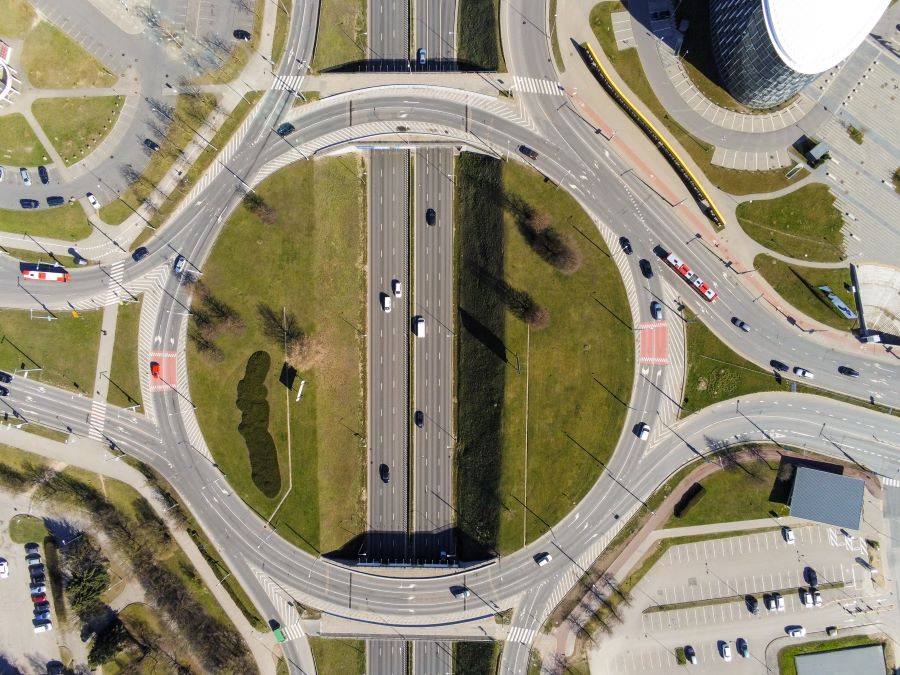A 50 km pilot study and capacity building has recently been completed in Lithuania, representing the first iRAP assessment in the country.
The pilot focussed on two road sections of motorway and primary roads. The results showed the selected sections rated mostly between 2 and 3-stars, with speed being a major factor increasing crash risk. The speed limit of motorways and primary roads in Lithuania is 130 km/h and 90 km/h respectively.
Training was delivered for representatives of the Transport Competence Agency department, Ministry of Transport and Communications led by United Kingdom RAP host, the Road Safety Foundation (RSF). The training will equip the Ministry to undertake future assessments and investment plan analysis to inform road infrastructure improvements to save lives.
RSF Executive Director Suzy Charman, who led the training said, “Safe road infrastructure and speeds are important components of the safe system, along with safe vehicles and safe road user behaviours. We hope this first assessment and new iRAP capacity in the country will help to inform Lithuania’s infrastructure strategy and investment approach in the coming years to 2030.”
Lithuania was awarded last year’s European Transport Safety Council (ETSC) Road Safety Performance Index (PIN) Award, in recognition of major improvements in road safety in the decade from 2011 to 2021. Out of the European countries tracked by ETSC, Lithuania was the only EU country to halve road deaths in the period.
Responsibility for the organisation of road safety in Lithuania lies with the Ministry of Transport and Communications, supported by the Lithuanian Transport Safety Administration and the Lithuanian Road Administration.
According to the Ministry, 120 people died on Lithuanian roads in 2022, which is the lowest number of road fatalities in the entire period of independence. Last year, there were 43 road deaths per million inhabitants, a rate that for the first time matched with the European Union (EU) average in recent years.
In 2020, the Ministry introduced the Road Safety Programme “Vision Zero”. The programme aims to achieve zero road fatalities in the country by 2050. A new interim target for 2030 has been set to halve the number of road fatalities compared to 2020.
The 2035 National Road Development and Maintenance Strategy outlines the long-term development plans for the country’s national roads including modernisation of vital highways, substantial improvement of the condition of roads and more than 70 bridges, the pavement of 1,900km of gravel roads, and elimination of dangerous intersections.
The development of bicycle path infrastructure is a priority with the upgrade of 350 km of existing paths and construction of 600 km of new paths, increasing the path network length in residential areas by nearly 50%.
Urgent repairs will also be undertaken on over 1,700 pedestrian crossings with the aim is to eliminate unsafe pedestrian crossings on roads of national importance by 2024.
Lithuania assumed the Presidency of the International Transport Forum in May, an intergovernmental organisation with 66 member countries. It acts as a think tank for transport policy and organises the Annual Summit of transport ministers.
On assuming the chairmanship of the ITF Council of Ministers, Minister of Transport and Communications Marius Skuodis said, “This serves as recognition of Lithuania’s credibility and the standing of our transport sector on the global stage. Such a status will accelerate the transport sector’s transformation with advanced technical and management solutions. Simultaneously, this presents a unique chance for Lithuanian businesses, the transport community, as well as experts and researchers to showcase the nation’s innovative solutions on a broader scale, and to develop enduring partnerships with international peers,”
According to iRAP’s Safety Insights Explorer, achieving UN Target 4 for greater than 75% of travel on 3-star or better roads for all road users in the country by 2030 stands to save an estimated 11,352 fatalities and serious injuries over the 20-year life of road treatments with an economic benefit of USD$3.7 billion to Lithuania’s economy.
Images credit: Pexels Kestutis Paskevicius


















